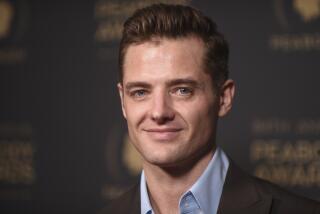Mr. Rogers Marks 30 Years in His TV ‘Neighborhood’
Wide-eyed respect, even reverence: that’s how grown-ups, from taxi drivers to TV stars, often react to Fred Rogers. If he wanted to, the PBS television icon could exchange his role as host of “Mister Rogers’ Neighborhood” for that of professional guru, offering jaded adults his trademark affirmations of self, inner quiet and respect.
It’s not likely to happen, however. This is a man who can be a difficult interview, not because of swollen ego but because of his intense interest in what other people think and feel. He’s the children’s advocate who will rarely eat on the show because he knows he can’t “reach through the glass and offer it to the little ones” in need.
He’s the PBS luminary whose 1997 honors included Emmys for best performer in a children’s series and for lifetime achievement as well as a lifetime achievement award from the American Television Critics Assn.--yet the honor he treasures more highly is to be considered trustworthy.
“I could have been blessed in a hundred different jobs. It’s just that this is the one I got,” said Rogers, who will be 70 in March and who will celebrate his 30th anniversary on PBS this week with new “Neighborhood” programming about giving and receiving.
“The way people receive can be a gift in itself,” he said about one of the week’s goals, but he had to work to keep that in mind when he was given a star on the Hollywood Walk of Fame in January. Rogers agonized over whether it was appropriate, still seeking advice on how to feel about it the day before the ceremony.
“I think I just want to run away,” he said wryly. In the end, he accepted the award on behalf of the children, “who are far, far greater than any star in the sky.”
Though he may be garnering the kind of accolades that often signal the end of a career, Rogers, a fit and trim vegetarian who swims every morning at sunrise, has no intention of retiring any time soon. Nor does he intend to change his show, a gentle exploration of children’s feelings, their developmental milestones and the hows and whys of things. Rogers’ approach, frequently lampooned, is his reassuring, carefully enunciated, one-on-one colloquy with viewers.
“The temptation to do something faster, louder and flashier is one I don’t ever want to succumb to,” he said. “People might look at it as vintage, but this has always been a program where the insides are much more important than the wrapping. Children’s attention can be grabbed by the wrapping, to be sure, but it’s the steady, trusting, solid message that endures.”
Alice Cahn, director of PBS children’s programming, concurs.
“I can’t imagine asking Fred to jazz up his show,” she said. “Children are growing up in a world that is perhaps more sophisticated, certainly more technological, than it was 30 years ago, but a 2-year-old is still a 2-year-old and a 4-year-old is still a 4-year-old. The same developmental needs still apply.”
Donald G. Youpa has been a Rogers’ fan since his days as director of children’s programs for the Sears Foundation in Chicago, where he was a primary force behind Sears’ funding of the “Neighborhood” series shortly after its Feb. 19, 1968, premiere.
“A lot of people don’t understand what he does,” said Youpa, now executive vice president and chief operating officer at KCET-TV Channel 28. “You have to watch it for a while to see the depth of what he achieves and how he communicates with children, with a message so deep and sensitive and caring.”
For his part, Rogers, who sets aside an hour every morning for silent reflection and inspirational reading, finds nourishment in the words and deeds of others.
One of those is the acclaimed cellist Yo-Yo Ma, a frequent “Neighborhood” visitor. Recalling how he witnessed Ma’s encouragement of an aspiring young cellist, Rogers noted that Ma follows one of Rogers’ own basic tenets: “He respects the uniqueness of the person.”
“If only people can incorporate this message,” Rogers said, “that there is nobody else in this whole world that’s like you. That doesn’t mean that you go off with a big head. It just means: Imagine what this creation is like.”
Ma said he responds to Rogers’ “deep, deep love of music”--at one time, Rogers studied to become a concert pianist; his wife Joanne was one--and to the “Neighborhood” host’s “absolute genuineness,” on screen and off.
“He is that person through and through,” Ma said.
Beth Sullivan, executive producer of CBS’ “Dr. Quinn, Medicine Woman,” meanwhile, calls herself Rogers’ “biggest fan,” having discovered the “Neighborhood” as a young adult at a vulnerable time in her life. With much effort she persuaded Rogers to make a brief appearance on a 1996 show as a Presbyterian minister (Rogers really is one).
“He’s an extraordinary person,” Sullivan said with unabashed fervor. “I’ve only met a few people in my life that I would categorize as holy. Fred is a holy person.”
Sullivan is matched in her admiration for Rogers by someone who might be considered the competition. Angela Santomero, one of the creators of “Blue’s Clues,” a popular Nickelodeon series for preschoolers, cites Rogers as an inspiration, as do the show’s co-creators, Traci Paige Johnson and Todd Kessler.
“As a preschooler, I talked back to him and always wanted to jump into his world,” Santomero said. Her desire to “grow up and be able to create something of my own that would hopefully influence children the way that he did” led her to follow Rogers’ path of study in child development.
The Rogers-like elements in “Blue’s Clues” and the Disney Channel’s preschooler hit, “Bear in the Big Blue House,” don’t escape PBS executive Cahn, who, unsolicited, mentioned them as “standout programming. If we have a generation of creative producers who count Fred Rogers as their hero and their mentor, then I think the next generation of children are going to have some wonderful television ahead,” she said.
Rogers does have mixed feelings about his television role, however, and concerns about television in general.
“Anything on the medium that you happen to be associated with could be associated with you,” he worries. He is emphatic, too, that “television never be seen as a substitute for interpersonal relations.”
Yet he is also aware that there are those who need what he offers. Viewers’ response to his show tells him that--including confidences that the show helped some through childhood neglect and abuse. “It seems to me there are more of these letters in the last 10 years than there were before,” he said sadly.
“The older I get, the more I’m convinced that what is important is not what’s presented to us in packages or stars on sidewalks or any other outside thing,” Rogers mused. “The real miracle is life. And for us to be able to help the children to respect and honor life wherever they find it seems to me an everlasting challenge.”
* “Mister Rogers’ Neighborhood” airs weekdays at 12:30 p.m. on KCET-TV Channel 28.
More to Read
The complete guide to home viewing
Get Screen Gab for everything about the TV shows and streaming movies everyone’s talking about.
You may occasionally receive promotional content from the Los Angeles Times.






